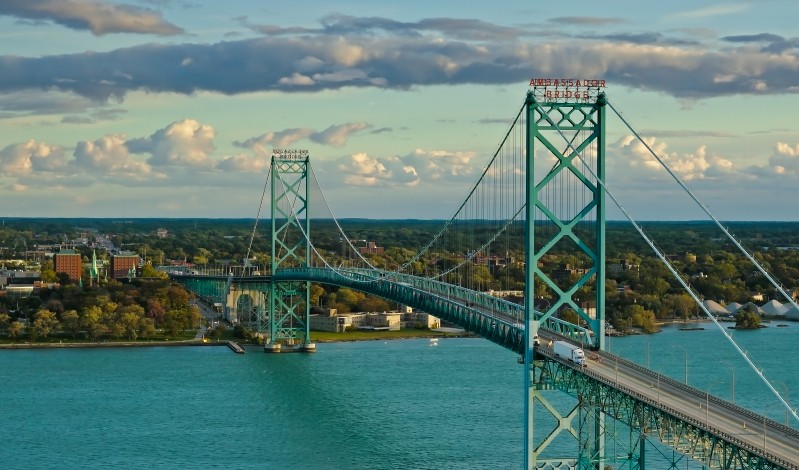
The President’s concern about trade partners’ “cheating” is an insufficient justification for the tariffs.
President Donald J. Trump’s recent executive order imposing a 25 percent tariff on goods imported from Canada and a 10 percent tariff on Canadian energy sources was ostensibly predicated on the flow of fentanyl across the northern border. Although the President tied similar tariffs on Mexican imports to the fentanyl crisis, he acknowledged that law enforcement has actually seized “much less fentanyl from Canada than from Mexico.”
“Much less” is an understatement. Fentanyl seizures at the Canadian border accounted for 0.2 percent of the amount of fentanyl that law enforcement has interdicted on either the Canadian or Mexican borders. The executive order’s stated rationale is not merely thin, but as the Wall Street Journal’s editorial board implied, it is also pretextual. After all, President Trump suspended the tariffs only hours before they were to take effect based on what the Journal’s editors termed “minor concessions” and claimed victory by writing on Truth Social that he was “very pleased with this initial outcome.” But as the Journal’s editorial board noted, because President Trump only agreed to a one-month pause, the tariffs could return in the future.
More likely, the real reason that the President imposed these tariffs was not to address the flow of drugs across the border, but, as he has stated over the course of his career, because he believes that every other nation is “cheating” the United States on trade. Sitting next to Journal owner Rupert Murdoch at an impromptu news conference a few days, ago, the President all but confirmed this. Asked to comment on the Journal’s unfavorable editorial he responded: “Not only is it not dumb, you’re going to see every single one of those countries is dying to make a deal. You know why? Because they’re ripping us off.” Why does the real reason for the tariffs matter?
If the President’s executive order were instead the action of an administrative agency, lying about the reasons for agency action would render the ruling arbitrary. That was the case in Department of Commerce v. New York, where the U.S. Supreme Court struck down the U.S. Department of Commerce’s decision to add a citizenship question to its decennial census questionnaire. Secretary of Commerce Wilbur Ross’s stated explanation was that the agency added the question at the behest of the U.S. Department of Justice to aid in enforcing the Voting Rights Act. The Court ruled, however, that this explanation was “pretextual,” rendering the agency’s decision arbitrary and capricious under the Administrative Procedure Act.
To be sure, the same Supreme Court ruled in Trump v. Hawaii that when evaluating the lawfulness of presidential actions that reflect core presidential functions—as opposed to the actions of administrative agencies—it will not look beyond the President’s official stated reasons. In Trump v. Hawaii, the Court was asked to consider what the plaintiffs described as the President’s racist tweets. Importantly, the presidential function in Trump v. Hawaii involved “the admission and exclusion of foreign nationals,” which the Court termed a “fundamental sovereign attribute…largely immune from judicial control.” But a president’s executive orders based on congressionally granted authority—as opposed to authority granted by the U.S. Constitution—must still be tied to the statutory authority that the president has claimed.
In the case of the Canadian tariffs, that means the authority granted by the International Emergency Economic Powers Act “may only be exercised to deal with an unusual and extraordinary threat with respect to which a national emergency has been declared.” The rapidity with which President Trump suspended his national emergency-based tariffs and the thin rationale for suspension, at least call into question whether his actions were really prompted by “an unusual and extraordinary threat” to our “national security and foreign policy.”
Ten years ago, I warned in the Harvard Business Law Review Online that barriers to the importation of Canadian hydroelectric power, imposed by several states on the United States border, likely violated the Constitution’s Dormant Commerce Clause. By propping up more expensive local renewable energy sources, I added, these protectionist measures were antithetical to those states’ broader goal of expanding the use of renewable energy at a reasonable cost to consumers. I urged those states instead to follow the lead of Vermont and Wisconsin—which had both reversed their policies—and allow Canadian hydroelectric power to compete. In the intervening years, Vermont has signed contracts with Hydro Québec that now account for more than half of its electricity supply. Since Vermont law will require its utilities to purchase or generate all of their electricity from renewable resources by 2030, stiff federal tariffs on imported Quebec hydropower will raise their energy costs substantially. Other states, not quite as dependent, could see their energy costs go up, too.
One of the reasons that the Supreme Court has given for denying states the authority to impose barriers to foreign imports is that “discriminatory treatment of foreign commerce may create problems, such as the potential for international retaliation, that concern the Nation as a whole.” We ought to view with great skepticism presidentially imposed tariffs predicated on cheating by our nation’s favored trading partners for the same reason: They could also spark retaliation. After all, where there is real cheating—such as when a foreign government subsidizes of its one of its domestic industry’s exports—there are U.S. and international trade laws to address it.
“Dumping,” or the sale of subsidized products into foreign markets at prices lower than in the seller’s domestic market, is already illegal and justifies the imposition of “countervailing duties,” another term for tariffs. That should be sufficient protection, especially in the case of neighboring countries such as Mexico and Canada, with which President Trump has already negotiated a fair trade agreement—the United States-Mexico-Canada Agreement (USMCA).
The Office of the United States Trade Representative described that agreement as “a mutually beneficial win for North American workers, farmers, ranchers, and businesses.” At the time he signed it, President Trump was even more effusive. “The USMCA,” he boasted, “is the fairest, most balanced, and beneficial trade agreement we have ever signed into law. It’s the best agreement we’ve ever made.” Enough said.




